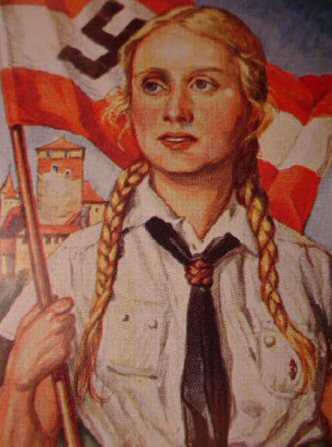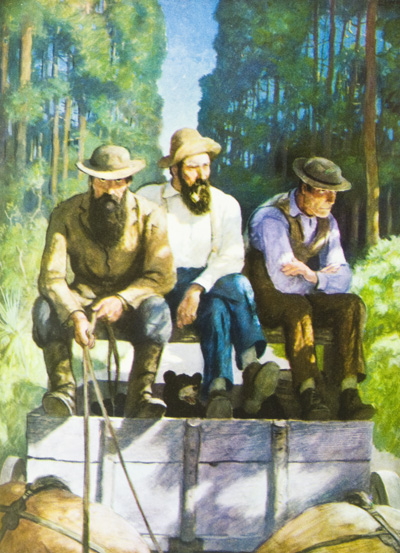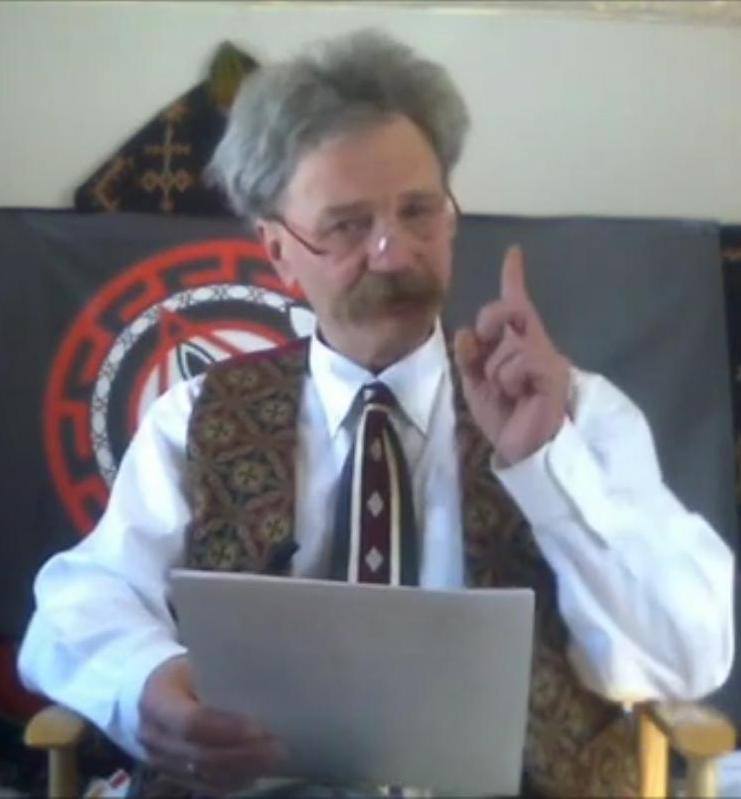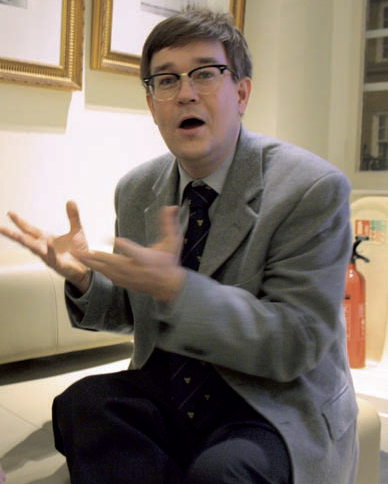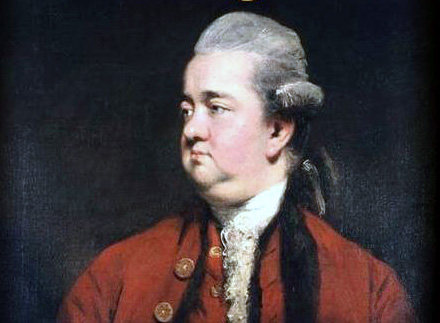
The History of the Decline and Fall
of the Roman Empire
Chapter XXII: Julian declared emperor
Part IV
The numerous army of spies, of agents, and informers enlisted by Constantius to secure the repose of one man, and to interrupt that of millions, was immediately disbanded by his generous successor. Julian was slow in his suspicions, and gentle in his punishments; and his contempt of treason was the result of judgment, of vanity, and of courage.
Conscious of superior merit, he was persuaded that few among his subjects would dare to meet him in the field, to attempt his life, or even to seat themselves on his vacant throne. The philosopher could excuse the hasty sallies of discontent; and the hero could despise the ambitious projects which surpassed the fortune or the abilities of the rash conspirators.
A citizen of Ancyra had prepared for his own use a purple garment; and this indiscreet action, which, under the reign of Constantius, would have been considered as a capital offence, was reported to Julian by the officious importunity of a private enemy. The monarch, after making some inquiry into the rank and character of his rival, despatched the informer with a present of a pair of purple slippers, to complete the magnificence of his Imperial habit.
A more dangerous conspiracy was formed by ten of the domestic guards, who had resolved to assassinate Julian in the field of exercise near Antioch. Their intemperance revealed their guilt; and they were conducted in chains to the presence of their injured sovereign, who, after a lively representation of the wickedness and folly of their enterprise, instead of a death of torture, which they deserved and expected, pronounced a sentence of exile against the two principal offenders.
The only instance in which Julian seemed to depart from his accustomed clemency, was the execution of a rash youth, who, with a feeble hand, had aspired to seize the reins of empire. But that youth was the son of Marcellus, the general of cavalry, who, in the first campaign of the Gallic war, had deserted the standard of the Cæsar and the republic. Without appearing to indulge his personal resentment, Julian might easily confound the crime of the son and of the father; but he was reconciled by the distress of Marcellus, and the liberality of the emperor endeavored to heal the wound which had been inflicted by the hand of justice.
Julian was not insensible of the advantages of freedom. From his studies he had imbibed the spirit of ancient sages and heroes; his life and fortunes had depended on the caprice of a tyrant; and when he ascended the throne, his pride was sometimes mortified by the reflection, that the slaves who would not dare to censure his defects were not worthy to applaud his virtues. He sincerely abhorred the system of Oriental despotism, which Diocletian, Constantine, and the patient habits of fourscore years, had established in the empire. A motive of superstition prevented the execution of the design, which Julian had frequently meditated, of relieving his head from the weight of a costly diadem; but he absolutely refused the title of Dominus, or Lord, a word which was grown so familiar to the ears of the Romans, that they no longer remembered its servile and humiliating origin.
The office, or rather the name, of consul, was cherished by a prince who contemplated with reverence the ruins of the republic; and the same behavior which had been assumed by the prudence of Augustus was adopted by Julian from choice and inclination. On the calends of January, at break of day, the new consuls, Mamertinus and Nevitta, hastened to the palace to salute the emperor. As soon as he was informed of their approach, he leaped from his throne, eagerly advanced to meet them, and compelled the blushing magistrates to receive the demonstrations of his affected humility. From the palace they proceeded to the senate.
The emperor, on foot, marched before their litters; and the gazing multitude admired the image of ancient times, or secretly blamed a conduct, which, in their eyes, degraded the majesty of the purple. But the behavior of Julian was uniformly supported. During the games of the Circus, he had, imprudently or designedly, performed the manumission of a slave in the presence of the consul. The moment he was reminded that he had trespassed on the jurisdiction of another magistrate, he condemned himself to pay a fine of ten pounds of gold; and embraced this public occasion of declaring to the world, that he was subject, like the rest of his fellow-citizens, to the laws, and even to the forms, of the republic.
The spirit of his administration, and his regard for the place of his nativity, induced Julian to confer on the senate of Constantinople the same honors, privileges, and authority, which were still enjoyed by the senate of ancient Rome. A legal fiction was introduced, and gradually established, that one half of the national council had migrated into the East; and the despotic successors of Julian, accepting the title of Senators, acknowledged themselves the members of a respectable body, which was permitted to represent the majesty of the Roman name.
From Constantinople, the attention of the monarch was extended to the municipal senates of the provinces. He abolished, by repeated edicts, the unjust and pernicious exemptions which had withdrawn so many idle citizens from the services of their country; and by imposing an equal distribution of public duties, he restored the strength, the splendor, or, according to the glowing expression of Libanius, the soul of the expiring cities of his empire. The venerable age of Greece excited the most tender compassion in the mind of Julian, which kindled into rapture when he recollected the gods, the heroes, and the men superior to heroes and to gods, who have bequeathed to the latest posterity the monuments of their genius, or the example of their virtues. He relieved the distress, and restored the beauty, of the cities of Epirus and Peloponnesus. Athens acknowledged him for her benefactor; Argos, for her deliverer.
The pride of Corinth, again rising from her ruins with the honors of a Roman colony, exacted a tribute from the adjacent republics, for the purpose of defraying the games of the Isthmus, which were celebrated in the amphitheatre with the hunting of bears and panthers. From this tribute the cities of Elis, of Delphi, and of Argos, which had inherited from their remote ancestors the sacred office of perpetuating the Olympic, the Pythian, and the Nemean games, claimed a just exemption. The immunity of Elis and Delphi was respected by the Corinthians; but the poverty of Argos tempted the insolence of oppression; and the feeble complaints of its deputies were silenced by the decree of a provincial magistrate, who seems to have consulted only the interest of the capital in which he resided.
Seven years after this sentence, Julian allowed the cause to be referred to a superior tribunal; and his eloquence was interposed, most probably with success, in the defence of a city, which had been the royal seat of Agamemnon, and had given to Macedonia a race of kings and conquerors. The laborious administration of military and civil affairs, which were multiplied in proportion to the extent of the empire, exercised the abilities of Julian; but he frequently assumed the two characters of Orator and of Judge, which are almost unknown to the modern sovereigns of Europe.
The arts of persuasion, so diligently cultivated by the first Cæsars, were neglected by the military ignorance and Asiatic pride of their successors; and if they condescended to harangue the soldiers, whom they feared, they treated with silent disdain the senators, whom they despised. The assemblies of the senate, which Constantius had avoided, were considered by Julian as the place where he could exhibit, with the most propriety, the maxims of a republican, and the talents of a rhetorician. He alternately practised, as in a school of declamation, the several modes of praise, of censure, of exhortation; and his friend Libanius has remarked, that the study of Homer taught him to imitate the simple, concise style of Menelaus, the copiousness of Nestor, whose words descended like the flakes of a winter’s snow, or the pathetic and forcible eloquence of Ulysses.
The functions of a judge, which are sometimes incompatible with those of a prince, were exercised by Julian, not only as a duty, but as an amusement; and although he might have trusted the integrity and discernment of his Prætorian præfects, he often placed himself by their side on the seat of judgment. The acute penetration of his mind was agreeably occupied in detecting and defeating the chicanery of the advocates, who labored to disguise the truths of facts, and to pervert the sense of the laws. He sometimes forgot the gravity of his station, asked indiscreet or unseasonable questions, and betrayed, by the loudness of his voice, and the agitation of his body, the earnest vehemence with which he maintained his opinion against the judges, the advocates, and their clients.
But his knowledge of his own temper prompted him to encourage, and even to solicit, the reproof of his friends and ministers; and whenever they ventured to oppose the irregular sallies of his passions, the spectators could observe the shame, as well as the gratitude, of their monarch. The decrees of Julian were almost always founded on the principles of justice; and he had the firmness to resist the two most dangerous temptations, which assault the tribunal of a sovereign, under the specious forms of compassion and equity.
He decided the merits of the cause without weighing the circumstances of the parties; and the poor, whom he wished to relieve, were condemned to satisfy the just demands of a wealthy and noble adversary. He carefully distinguished the judge from the legislator; and though he meditated a necessary reformation of the Roman jurisprudence, he pronounced sentence according to the strict and literal interpretation of those laws, which the magistrates were bound to execute, and the subjects to obey. The generality of princes, if they were stripped of their purple, and cast naked into the world, would immediately sink to the lowest rank of society, without a hope of emerging from their obscurity. But the personal merit of Julian was, in some measure, independent of his fortune.
Whatever had been his choice of life, by the force of intrepid courage, lively wit, and intense application, he would have obtained, or at least he would have deserved, the highest honors of his profession; and Julian might have raised himself to the rank of minister, or general, of the state in which he was born a private citizen. If the jealous caprice of power had disappointed his expectations, if he had prudently declined the paths of greatness, the employment of the same talents in studious solitude would have placed beyond the reach of kings his present happiness and his immortal fame.
When we inspect, with minute, or perhaps malevolent attention, the portrait of Julian, something seems wanting to the grace and perfection of the whole figure. His genius was less powerful and sublime than that of Cæsar; nor did he possess the consummate prudence of Augustus. The virtues of Trajan appear more steady and natural, and the philosophy of Marcus is more simple and consistent.
Yet Julian sustained adversity with firmness, and prosperity with moderation. After an interval of one hundred and twenty years from the death of Alexander Severus, the Romans beheld an emperor who made no distinction between his duties and his pleasures; who labored to relieve the distress, and to revive the spirit, of his subjects; and who endeavored always to connect authority with merit, and happiness with virtue. Even faction, and religious faction, was constrained to acknowledge the superiority of his genius, in peace a swell as in war, and to confess, with a sigh, that the apostate Julian was a lover of his country, and that he deserved the empire of the world.

